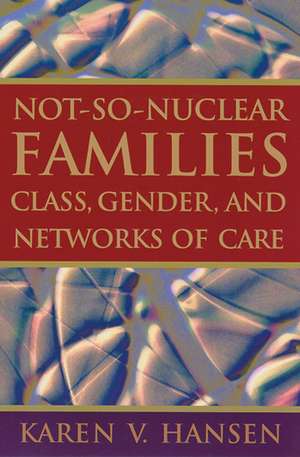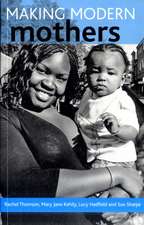Not-So-Nuclear Families: Class, Gender, and Networks of Care
Autor Karen V. Hansenen Limba Engleză Paperback – 24 noi 2004
In recent years U.S. public policy has focused on strengthening the nuclear family as a primary strategy for improving the lives of America's youth. It is often assumed that this normative type of family is an independent, self-sufficient unit adequate for raising children. But half of all households in the United States with young children have two employed parents. How do working parents provide care and mobilize the help that they need?
In Not-So-Nuclear Families: Class, Gender, and Networks of Care, Karen V. Hansen investigates the lives of working parents and the informal networks they construct to help care for their children. She chronicles the conflicts, hardships, and triumphs of four families of various social classes. Each must navigate the ideology that mandates that parents, mothers in particular, rear their own children, in the face of an economic reality that requires that parents rely on the help of others. In vivid family stories, parents detail how they and their networks of friends, paid caregivers, and extended kin collectively close the "care gap" for their school-aged children.
Hansen not only debunks the myth that families in the United States are independent, isolated, and self-reliant units, she breaks new theoretical ground by asserting that informal networks of care can potentially provide unique and valuable bonds that nuclear families cannot.
In Not-So-Nuclear Families: Class, Gender, and Networks of Care, Karen V. Hansen investigates the lives of working parents and the informal networks they construct to help care for their children. She chronicles the conflicts, hardships, and triumphs of four families of various social classes. Each must navigate the ideology that mandates that parents, mothers in particular, rear their own children, in the face of an economic reality that requires that parents rely on the help of others. In vivid family stories, parents detail how they and their networks of friends, paid caregivers, and extended kin collectively close the "care gap" for their school-aged children.
Hansen not only debunks the myth that families in the United States are independent, isolated, and self-reliant units, she breaks new theoretical ground by asserting that informal networks of care can potentially provide unique and valuable bonds that nuclear families cannot.
Preț: 289.87 lei
Nou
Puncte Express: 435
Preț estimativ în valută:
55.47€ • 57.80$ • 45.93£
55.47€ • 57.80$ • 45.93£
Carte tipărită la comandă
Livrare economică 03-17 aprilie
Preluare comenzi: 021 569.72.76
Specificații
ISBN-13: 9780813535012
ISBN-10: 0813535018
Pagini: 288
Ilustrații: 2 figures, 7 tables
Dimensiuni: 152 x 229 x 15 mm
Greutate: 0.4 kg
Ediția:None
Editura: Rutgers University Press
Colecția Rutgers University Press
ISBN-10: 0813535018
Pagini: 288
Ilustrații: 2 figures, 7 tables
Dimensiuni: 152 x 229 x 15 mm
Greutate: 0.4 kg
Ediția:None
Editura: Rutgers University Press
Colecția Rutgers University Press
Notă biografică
KAREN V. HANSEN is an associate professor of sociology and women's studies at Brandeis University and is the co-editor of Families in the U.S.: Kinship and Domestic Politics.
Cuprins
List of Tables and Figures
Preface and Acknowledgments
Chapter 1. Networks of Interdependence in an Age of Independence
Part I. Profiles of Four Networks of Interdependence
Chapter 2. The Cranes: An Absorbent Safety Net
Chapter 3. The Aldriches: A Family Foundation
Chapter 4. The Duvall-Brennans: A Loose Association of Advisors
Chapter 5. The Beckers: A Warm Web of People
Part II. Constructing and Maintaining Networks
Chapter 6. Staging Networks: Inclusion and Exclusion
Chapter 7. The Tangle of Reciprocity
Chapter 8. Men, Women, and the Gender of Caregiving
Conclusion
Appendix
Notes
Bibliography
Index
Preface and Acknowledgments
Chapter 1. Networks of Interdependence in an Age of Independence
Part I. Profiles of Four Networks of Interdependence
Chapter 2. The Cranes: An Absorbent Safety Net
Chapter 3. The Aldriches: A Family Foundation
Chapter 4. The Duvall-Brennans: A Loose Association of Advisors
Chapter 5. The Beckers: A Warm Web of People
Part II. Constructing and Maintaining Networks
Chapter 6. Staging Networks: Inclusion and Exclusion
Chapter 7. The Tangle of Reciprocity
Chapter 8. Men, Women, and the Gender of Caregiving
Conclusion
Appendix
Notes
Bibliography
Index
Descriere
In Not-So-Nuclear Families: Class, Gender, and Networks of Care, Karen V. Hansen investigates the lives of working parents and the informal networks they construct to help care for their children. She chronicles the conflicts, hardships, and triumphs of four families of various social classes. Each must navigate the ideology that mandates that parents, mothers in particular, rear their own children, in the face of an economic reality that requires that parents rely on the help of others. In vivid family stories, parents detail how they and their networks of friends, paid caregivers, and extended kin collectively close the "care gap" for their school-aged children.













